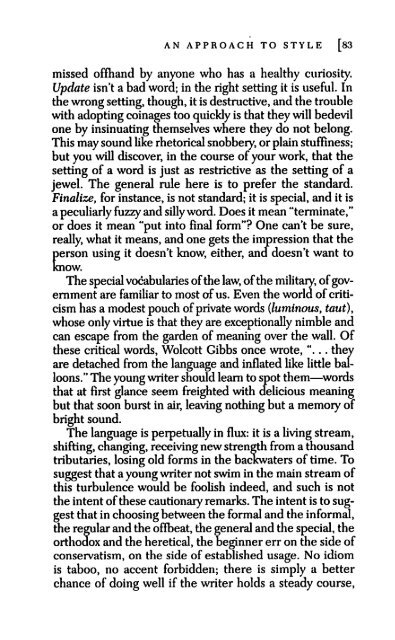You also want an ePaper? Increase the reach of your titles
YUMPU automatically turns print PDFs into web optimized ePapers that Google loves.
A N A P P R O A C H T O S T Y L E [ 8 3<br />
missed offhand by anyone who has a healthy curiosity.<br />
Update isn't a bad word; in the right setting it is useful. In<br />
the wrong setting, though, it is destructive, and the trouble<br />
with adopting coinages too quickly is that they will bedevil<br />
one by insinuating themselves where they do not belong.<br />
This may sound like rhetorical snobbery, or plain stuffiness;<br />
but you will discover, in the course of your work, that the<br />
setting of a word is just as restrictive as the setting of a<br />
jewel. <strong>The</strong> general rule here is to prefer the standard.<br />
Finalize, for instance, is not standard; it is special, and it is<br />
a peculiarly fuzzy and silly word. Does it mean "terminate,"<br />
or does it mean "put into final form"? One can't be sure,<br />
really, what it means, and one gets the impression that the<br />
person using it doesn't know, either, and doesn't want to<br />
know.<br />
<strong>The</strong> special vocabularies of the law, of the military, of gov<br />
ernment are familiar to most of us. Even the world of criti<br />
cism has a modest pouch of private words (luminous, taut),<br />
whose only virtue is that they are exceptionally nimble and<br />
can escape from the garden of meaning over the wall. <strong>Of</strong><br />
these critical words, Wolcott Gibbs once wrote, "... they<br />
are detached from the language and inflated like litde bal<br />
loons." <strong>The</strong> young writer should learn to spot them—words<br />
that at first glance seem freighted with delicious meaning<br />
but that soon burst in air, leaving nothing but a memory of<br />
bright sound.<br />
<strong>The</strong> language is perpetually in flux: it is a living stream,<br />
shifting, changing, receiving new strength from a thousand<br />
tributaries, losing old forms in the backwaters of time. To<br />
suggest that a young writer not swim in the main stream of<br />
this turbulence would be foolish indeed, and such is not<br />
the intent of these cautionary remarks. <strong>The</strong> intent is to sug<br />
gest that in choosing between the formal and the informal,<br />
die regular and the offbeat, the general and the special, the<br />
orthodox and the heretical, the beginner err on the side of<br />
conservatism, on the side of established usage. No idiom<br />
is taboo, no accent forbidden; there is simply a better<br />
chance of doing well if the writer holds a steady course,


